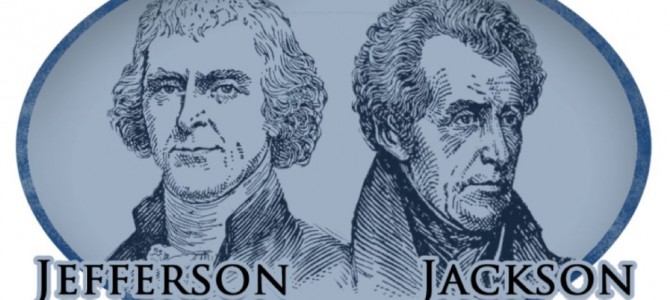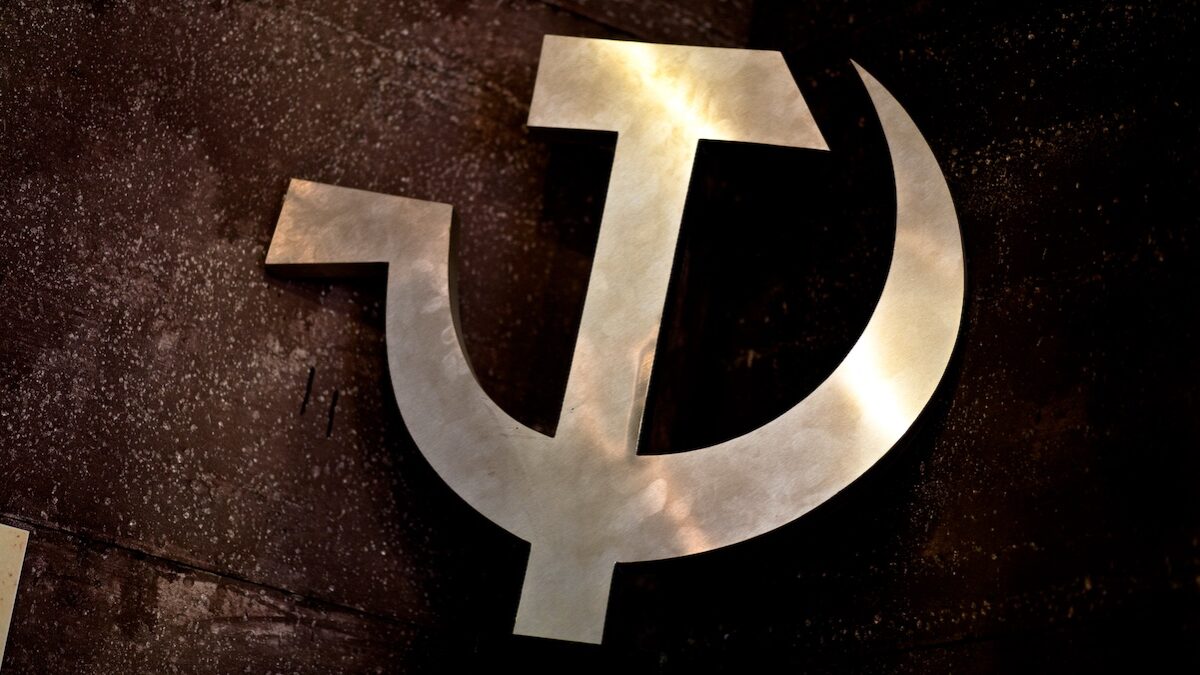
Last week, the organizers of the Democratic Party’s Jefferson-Jackson-Bailey Dinner in Connecticut (Bailey was a local machine politician) voted to drop the two former presidents from the event’s name, on the grounds that they were slave owners and therefore unworthy of the honor. There was no debate, and the decision took all of two minutes. Two other states, Missouri and Georgia, have also decided to drop Jefferson and Jackson, and there is now speculation—I would call it an expectation—that local Democrats in the rest of the country will follow suit.
Democrats have been holding dinners named after Jefferson and Jackson for as long as anyone can remember. They were considered the twin pillars of the party’s identity. Andrew Jackson was the symbol of the party’s common-man populism—which already seems antique for the party of condescending college-educated elites. And this is quite a kick in the gut for Thomas Jefferson because he was the founder of the party—though when he started it, he called it the Republican Party.
But still, it was Franklin Roosevelt, along with Democratic congressman John J. Boylan, who pushed for the construction of the Jefferson Memorial in 1934, and it was John Kennedy who burnished the Democrats’ reverence for Jefferson with his famous comment about Jefferson’s intellect.
The Democrats long ago rejected the essential legacy of both men. Andrew Jackson was an advocate of laissez-faire, and Thomas Jefferson was a Tea Party fanatic of the original vintage. Both men would have been appalled at the vast Leviathan state erected and guarded by today’s Democrats.
But that’s not why the Democrats rejected them. They were rejected because they also run afoul of our current racial and “diversity” politics. As the Connecticut party’s statement put it, “Democrats have led the way on civil rights, LGBT equality and equal rights for women…. It is only fitting that the name of the party’s most visible annual event reflects our dedication to diversity and forward-looking vision.” Crucially, nothing else those two presidents did was considered sufficient to mitigate their sins against diversity. In the case of Jefferson, this standard seems exceptionally harsh, considering that he helped found the United States itself—though maybe that wasn’t such a good thing. Plus, he elucidated the principle of individual rights, including that powerful line about all men being created equal, and he wrote passionately against slavery and helped ban the slave trade in 1807.
Not to worry, though, because the Democrats are “accepting suggestions for a new name” for their fund-raising dinners.
By these standards, one wonders who else among the party’s historical luminaries could possibly make the cut. Let’s consider the options.
Woodrow Wilson

The pre-Civil War Democrats are all tainted by slavery, and Grover Cleveland was laissez-faire, pro-business, and a union-buster, so forget him. But the next Democratic president is a good Progressive, Woodrow Wilson. In his first inaugural address, he proclaimed a change in the direct of the country, promising to restrain industry and “[perfect] the means by which government may be put at the service of humanity.” Sounds great, right?
Erm, think again. As he moved American into World War I, Wilson clamped down on anti-war activists, sending many of them to jail. But much worse by today’s standards, he reintroduced racial segregation into federal agencies, screened Birth of a Nation at the White House, and endorsed its glorification of the Ku Klux Klan. His son-in-law, William Gibbs McAdoo, played a major role in the administration, and his candidacy for president in 1924 helped transform that year’s Democratic convention into the notorious “Klanbake” dominated by the resurgence of segregationist Southerners.
So, um, no. If we can’t have a Jefferson-Jackson Dinner, we definitely can’t have a Woodrow Wilson Dinner.
FDR

Franklin Roosevelt created Social Security, and the New Deal was the template for the modern welfare state. For decades, he was a widely beloved Democratic hero.
But then there are the Japanese-American internment camps, which were imposed by FDR directly, by executive order. Whoops.
Harry Truman

Dropped the bomb on Japan. Next.
JFK

John F. Kennedy was a great liberal icon, who—well, he would have done a lot of stuff, all the stuff LBJ did, if he hadn’t been killed. (By a Communist, but whisper that part.) Still, he was an appealing symbol for the ideals of the Democratic Party.
Except for his attitude toward women, whom he viewed as little more than sexual playthings. And let’s just say that he didn’t adhere to “yes means yes.” As more details have become public about his sex life, he makes Don Draper seem like a sensitive soul, and no less a feminist arbiter than Naomi Wolf has hailed his transformation from an icon of liberalism to an icon of “male sexual privilege.” So definitely not him.
LBJ

Lyndon Johnson created Medicare and most of the modern welfare state. He signed the Civil Rights Act. He was the great architect of the modern Progressive state. Clearly, we should be naming things after him.
But then again, that lying SOB Johnson was hated by a generation of hippies for getting America into the Vietnam War. And before he flipped to supporting Civil Rights, he had a long career as an old-fashioned Dixiecrat who repeatedly opposed civil rights legislation. Oh, and he was a racist who used the n-word a lot. That comes from bona fide right-wing source: MSNBC.
You could argue that the good LBJ did for the cause of civil rights outweighed his personal flaws. But that’s not the standard we’re using any more, is it? I mean, if we can’t say that for Thomas Jefferson, how can we say it for LBJ?
Jimmy Carter

Now, we’re getting somewhere. For years, of course, Democrats tried to get over the mortal embarrassment of being associated with Jimmy Carter and his one excruciating term of gas lines, double-digit inflation, and utter humiliation on the world stage. But perhaps that’s all behind us, and we can now look back on him as a pious advocate of unimpeachable Progressive causes like housing the homeless and denouncing Israel as an Apartheid state.
But wait, he’s also an Evangelical Christian, and you know how those people scare the LGBTQ crowd. And his response to the energy crisis, which was just what we needed to cut carbon dioxide emissions, was to devote federal funds to support fracking. Maybe we can do better.
Bill Clinton

Hey, Bill Clinton was the first black president, right? But that seems kind of insensitive in retrospect, now that we’ve had the actual thing. First black president? More like first blackface president. Then there is his attitude toward women, which is less a JFK problem than a Bill Cosby problem—take it from feminist iconoclast Camille Paglia. Bill used to be able to gloss over it, downplay it as a bit of harmless fun, or get James Carville to smear the women as trailer-park trash. But that’s not so easy these days when the new feminist rules require us to believe the accusers. They do require that, don’t they?
And to make it all worse, Bill Clinton didn’t even get health care passed.
So that leaves us with….
Barack Obama

He is the actual first black president and the man who ushered in our current round of elevated racial tension—excuse me, enlightenment.
But then again, times and standards change, so you never know. After all, he used to deport a lot of Mexicans.
So maybe the Democrats should play it safe and avoid naming their events after anyone in particular and just have Democratic Party dinners. Then again, with so many reprobates in their history, I’m not sure the name “Democrat” is acceptable any more.
I’m actually willing to cut some of the Democrats’ icons a little slack for their regressive views. It is, after all, possible to be a force for progress even if you are not perfect, and we have to make so allowances for historical context. But if the left agrees to make that kind of exception for political figures from their own party, they might have to extend the same courtesy to everyone else. And that wouldn’t allow them to seize the moral high ground on race, which is the real point of the whole exercise.
But to gain and keep that high ground, Democrats are going to have to close themselves into a pristine world without any history—even their own.
Follow Robert on Twitter.









